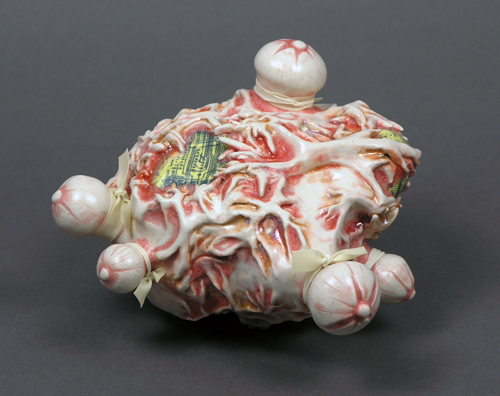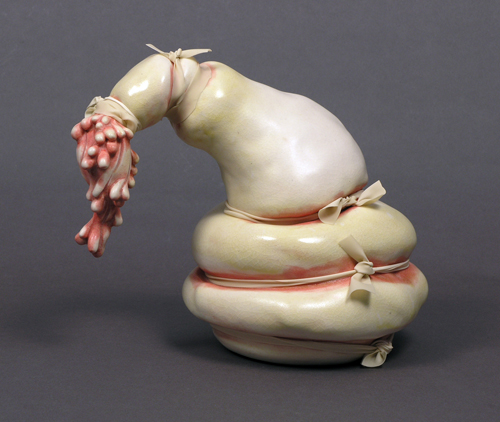
By Donald H. Harrison

SAN DIEGO- A Jewish ceramicist says she considers it fascinating that even a minor physical condition might influence a person’s entire personality and lifestyle. For example, she says, someone with a lisp might decide to build a vocabulary that largely omits words with the letter ‘s.’
Now an associate professor of art and head of the ceramics program at Palomar College, Reibstein is showing her works through April 12 with those of two fellow ceramicists and art educators — Kelly Berning of Mira Costa College and Yoonchung Kim of San Diego City College– at the Hyde Gallery at Grossmont College in the East San Diego County city of El Cajon. That gallery’s new curator, John Chwekun, also is a ceramicist.
Reibstein’s works most recently have focused on differences in physiologies, allowing people to imagine how miniscule differences in the contours or functionality of various organs, might manifest themselves in widely varying personalities.
In the current exhibition, for example, one of Reibstein’s works is a series of ceramic brains. From a distance they all look alike, but once you look at them up close and serially, a viewer can see slight differences in the two hemispheres of each. What would such configurations do the personalities of the people whose lives those brains rule?
Reibstein, who lives in La Mesa, said that one of her motives in creating her ceramics is to “question the relationship between our physiology and psychology and ask viewers to reflect on how their experiences with their bodies have shaped their identities.”

At her childhood home in Philadelphia, she said, “there was always an interest in how our bodies functioned. My grandfather owned a pharmacy in Topeka, Kansas, so pharmaceuticals were always part of our family history as well.”
Her father, a marketing professor, and her mother, an accountant, were always comfortable “talking about bodily functions, ranging from routine complaints to full blown hypochondria,” she said.
She added that some medical tragedies resulting in losses in her family “shaped relationships between family members and our own perceptions of each other.”
The artist added in an email interview: “Growing up in the 80’s, I was infused with a desire to express myself from an early age. For many years this manifested as a desire to be a musician, for which I enjoyed molding my body into art through fashion.” As she grew older, “I realized that I was not particularly gifted musically but that I was interested in a much quieter, intimate form of expression.
“By college,” recalled Reibstein, “I was an avid writer and painter, majoring in both at the University of Michigan. I quickly discovered ceramics, which allowed me a great physicality to which I strongly responded.”
After graduating with degrees in painting and ceramics, she returned to her home city of Philadelphia where she managed a ceramics studio at the Main Line Arts Center and began a teaching career that brought her to San Diego County in 2006.
While her parents weren’t engaged in the arts, “they were very strong believers in following your passion,” Reibstein said. “For my father this was marketing and it was something that he would actively discuss, demonstrating his incredible enthusiasm for the field. I was equally encouraged to follow my heart and to spend my life doing what I loved, not necessarily what seemed to be practical. I grew up with the belief that if you worked hard enough you could succeed in any field and it was that belief that I wholeheartedly threw myself into the arts.”
Reibstein reflected that her Jewish heritage also affected her development, “as I was raised in a culture that actively encourages curiosity and discourse.”
Her interest in the diversity of people, she suggested, may have been influenced by the fact that as a Jew, “I always felt like an outsider, which I don’t think of, at all, as a bad thing. I think it allowed me to relate to all sorts of individuals and to celebrate diversity whether it be racial, religious, cultural or physical.
“I do believe that that diversity is beautiful and my art seeks to explore a more unconventional beauty than is traditionally accepted,” she said.
Reflecting further on her Jewish upbringing, she speculated, “there are a few aspects of my work that I think may have been influenced by my upbringing including a belief in tradition and repetition, which both play large roles in my physical process as well as a life-long desire to ask questions and seek answers.
“I also find the Hebrew language and many of the songs and readings I grew up with to be very poetic and to carry with them a melancholic beauty.”
Many of Reibstein’s ceramic pieces begin with a drawing, but as she begins working the piece, “details of the work emerge.” In other instances, “I do a series of sketches as well as research images for use either as references or as part of my image transfer process. Most works usually begin with a gut feeling that I toil over for months before beginning to work in attempt to capture something that authentically captures a feeling or experience.”
Reibstein said while she hopes her pieces might broaden a viewer’s understanding of physiology, “I believe strongly that once something has been created it has a life of its own and can be interpreted in thousands of different ways, based on the perspective of the viewer.”
However personal her work is to her, “it is not important at all that the viewer understand any of the details of my experiences that inspired the work. I would much rather that the viewer can input their own experiences into each piece so that it can be equally intimate to them.
“I strongly think of my works as asking questions, not giving answers, as most of them reflect on the incredible amount of ambiguity with which we live our daily lives.”
*
Harrison is editor of San Diego Jewish World. He may be contacted at donald.harrison@sdjewishworld.com